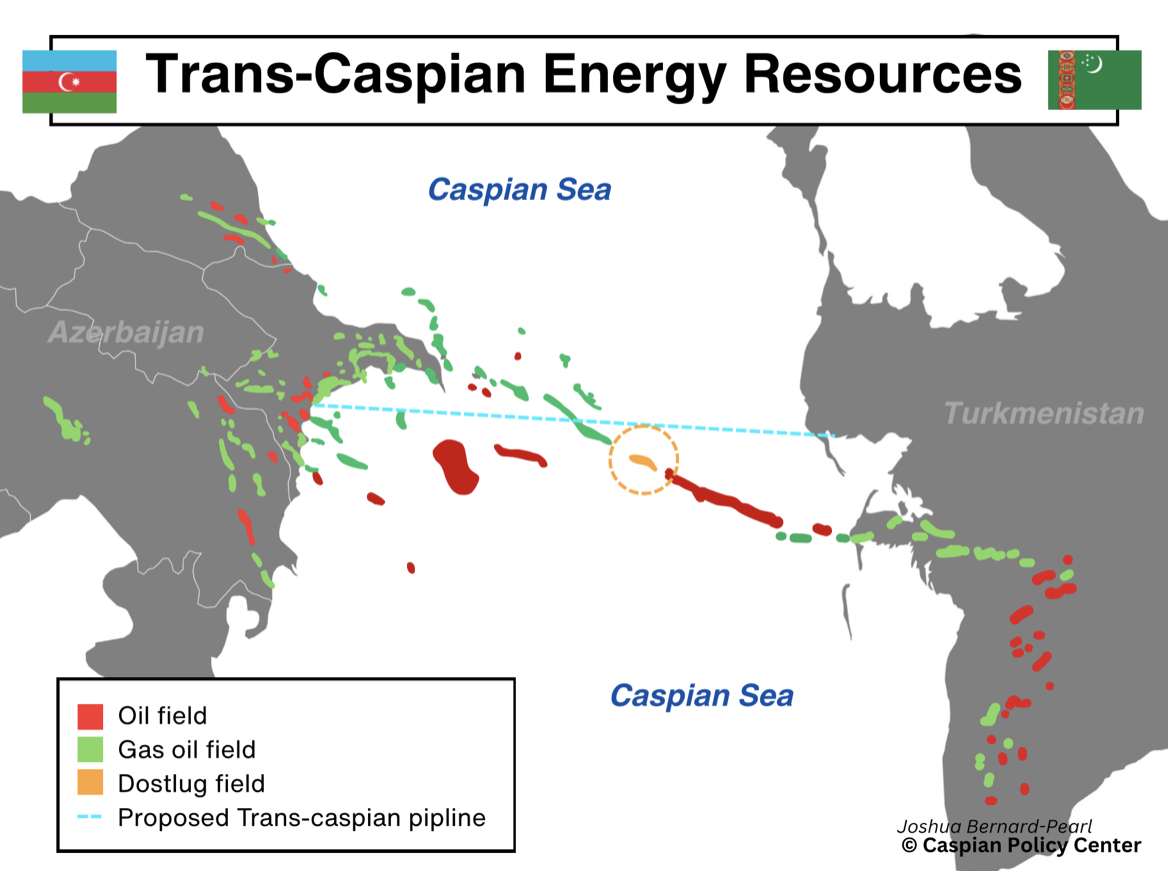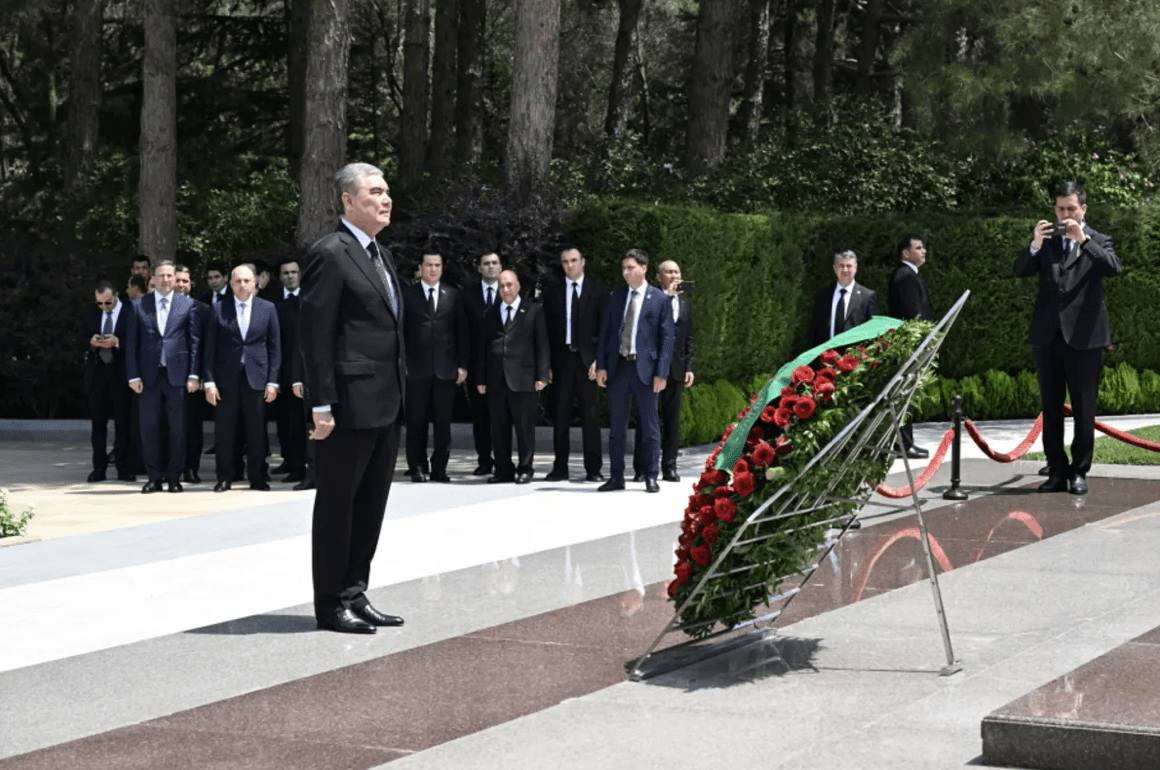Caspian Convergence: Turkmenistan-Azerbaijan Relations Enter a Strategic Phase
Recent Articles
Author: Joshua Bernard-Pearl
07/29/2025
The President of Azerbaijan hosted the former President of Turkmenistan for a historic three-day visit that included both one-on-one meetings and public ceremonies that demonstrated growing relations between the former Caspian rivals. Turkmenistan's Former President and current Chairman of the Halk Maslahaty (Peoples’ Council, equivalent of a parliament) of Turkmenistan, Gurbanguly Berdimuhamedow, met with Azerbaijan President Ilham Aliyev in Baku on July 16, on a visit that was framed as an expression of "brotherly relations" between the two nations. Not surprisingly, the substance of the talks largely revolved around energy cooperation alongside trade and transport connectivity.
The meeting followed and stair-stepped a July 3 visit with highest-level discussions by Turkmenistan Foreign Minister Rashid Meredov to Azerbaijan. While energy and trade remain key drivers, Berdimuhamedow’s visit also sheds light on how shared approaches to governance and leadership shape the relationship between Baku and Ashgabat. This relationship forms an increasingly strong foundation for future cooperation, potentially including pipeline infrastructure and increased trans-Caspian transport links.
Energy cooperation has long underpinned Turkmenistan-Azerbaijan relations. In 2021, the two countries signed a Memorandum of Understanding to jointly explore and develop the Dostluk oil and gas field, located in the Caspian Sea along their maritime border. The field is estimated to hold about 30 billion cubic meters (bcm) of gas and 50–100 million barrels of oil. Originally called “Kepez” by Azerbaijan and “Sardar” by Turkmenistan, the field’s name, “Dostluk/Dostluq/Dostlug” as of 2021, translates to "Friendship" in both the Azeri and Turkmen languages. It stands as both a symbolic representation and real example of good relations between Baku and Ashgabat.
 Map of oil and gas fields, including the Dostluk field, in the Caspian Sea between Azerbaijan and Turkmenistan, as well as the proposed route of the Trans-Caspian Pipeline.
Map of oil and gas fields, including the Dostluk field, in the Caspian Sea between Azerbaijan and Turkmenistan, as well as the proposed route of the Trans-Caspian Pipeline.
Beyond symbolism, the Dostluk field is a potential pivot point for regional energy dynamics. It could serve as a foundation for the long-discussed Trans-Caspian Gas Pipeline or the smaller Trans-Caspian interconnector, allowing Turkmenistan’s gas to flow to Europe via Azerbaijan, providing an alternative to Russian energy dominance. In the past, two major obstacles blocking the pipeline's construction have been weak demand signals from Europe for Turkmenistan’s gas and disputes between Azerbaijan and Turkmenistan on the exact demarcation of their naval border in the Caspian Sea. Russia’s full-scale invasion of Ukraine and Europe's subsequent efforts to diversify away from Russian energy have strengthened that demand. Meanwhile, increased energy cooperation in the Caspian between Azerbaijan and Turkmenistan around the Dostluk field could allow the countries to resolve issues of demarcation through joint exploitation of the area's natural resources.
The development of energy links, however, is only one part of a broader effort to advance regional cooperation. Increased trade along the Middle Corridor, running from China and Central Asia in the East, across the Caspian Sea, and on to Europe through the Caucasus, benefits both countries' economies and provides a key source of diversification away from the hydrocarbon industry. Increased trade between the ports of Turkmenbashi and Baku could play a key role in easing congestion along this route.
 National Leader of the Turkmen people and Chairman of the Halk Maslahaty Gurbanguly Berdimuhamedow lays wreath at the grave of President Ilham Aliyev’s father and former president Heydar Aliyev
National Leader of the Turkmen people and Chairman of the Halk Maslahaty Gurbanguly Berdimuhamedow lays wreath at the grave of President Ilham Aliyev’s father and former president Heydar Aliyev
During his visit, Berdimuhamedow also participated in a number of carefully choreographed public gestures, including laying wreaths at the graves of President Ilham Aliyev’s father and former president Heydar Aliyev and the grave of Ilham Aliyev’s mother. While these acts were presented as gestures of respect, they also underscored the continuity of family-based political leadership in both countries. Both countries run on top-down systems of governance rooted in personalist family legitimacy. President Ilham Aliyev followed in the footsteps of his father, former President Heydar Aliyev, who took power following the collapse of the Soviet Union. Former President Gurbanguly Berdimuhamedow stepped down from the role of president in 2022, while keeping de facto control of the country under the titles National Leader of the Turkmen people and Chairman of the Halk Maslahaty (People's Council) of Turkmenistan, to make room for his son Serdar Berdimuhamedow, who now holds the title of president. These shared styles of government, along with often referenced “brotherly” ethnic ties between Azeri and Turkmen people, have built a strong foundation for collaboration between the two countries' governments and populations.
For Turkmenistan, this visit offered a chance to signal openness to greater energy cooperation and economic integration. For Azerbaijan, it strengthened its position as a critical energy and transport hub linking Central Asia to Europe. For both ruling regimes, it reinforced their legitimacy through continued regional recognition. It remains to be seen if additional joint projects will be announced soon. However, from these recent meetings it is clear the Azerbaijan-Turkmenistan relationship is strong and set to grow further.